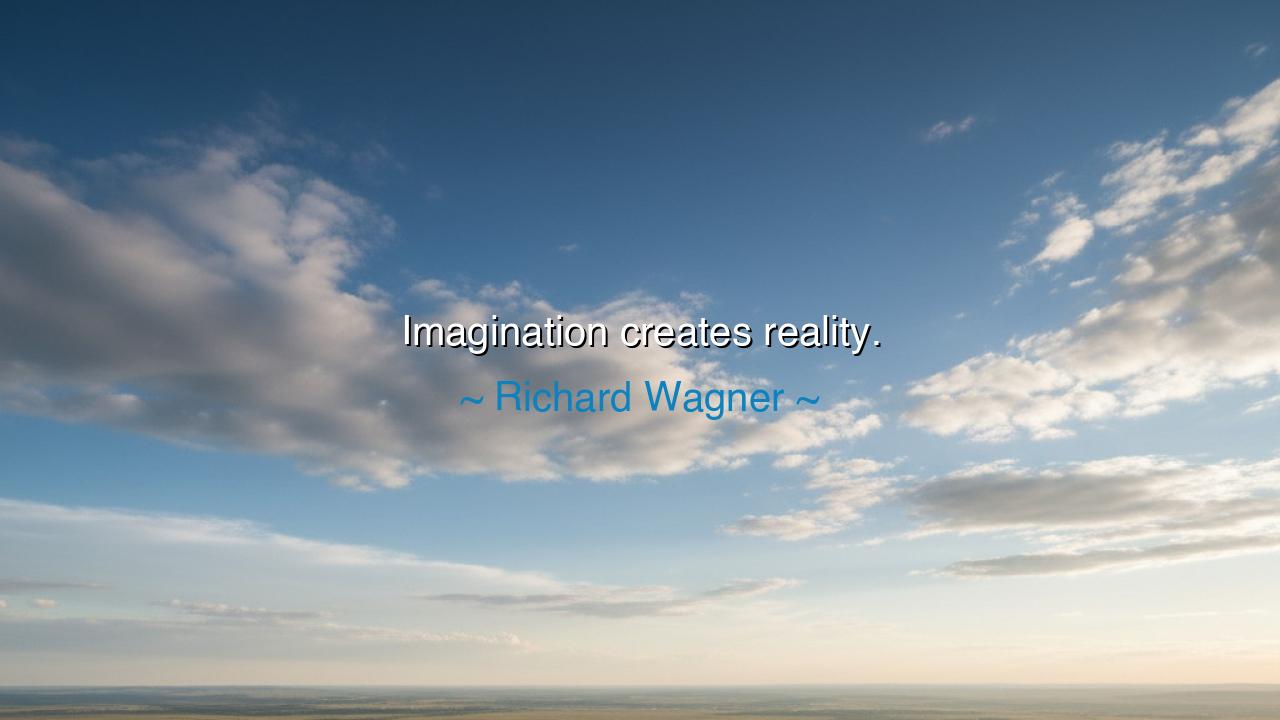
Imagination creates reality.






"Imagination creates reality." Thus spoke Richard Wagner, the composer of thunder and dream, whose art sought to unite sound, myth, and soul into one living flame. In these few words, he revealed a truth that echoes from the dawn of creation itself—that the imagination is not a mere shadow of thought, but the very forge of existence. The world we walk through, every stone, every law, every song, was once only an idea—a flicker of vision in the mind of a dreamer. To imagine, therefore, is to perform a sacred act, for through imagination, we bring the unseen into being. Wagner, who shaped entire worlds out of music and myth, knew that reality itself is but a canvas painted by the spirit.
Wagner’s life, though stormy, was proof of this truth. Born in obscurity, hunted by debt and rejection, he dared to dream not of small melodies but of worlds sung into existence. He imagined operas that were not mere performances but living myths, where gods and men shared the same tragic heart. Critics scorned him, kings dismissed him—but his vision would not die. Through his imagination, he built Bayreuth, a temple for his art, where sound and light fused into something eternal. He saw what did not yet exist—and because he saw it, he made it real. This is the essence of his saying: the imagination is not fantasy, but the architect of destiny.
The ancients knew this power well. Before any city was built, it was first dreamed in the mind of its founder. Before any law was written, it lived as an idea of justice in a philosopher’s heart. Even the universe itself, said the mystics, was born from divine imagination—a thought that became light, a dream that became matter. Imagination, therefore, is the bridge between the invisible and the visible, between spirit and form. When Wagner said it “creates reality,” he spoke not only as an artist but as a seer. He understood that all creation, whether cosmic or human, begins in the secret chambers of the mind.
Consider the story of Thomas Edison, who dreamed of harnessing light itself. In his age, the idea of illuminating the world by electricity seemed folly. Yet he held the vision in his mind and refused to release it, though failure followed failure. The world mocked him; still, his imagination burned on. One night, after countless attempts, his vision leapt into being—the first light bulb glowed, and darkness was defeated. Edison had not merely invented a lamp; he had proven Wagner’s truth: that imagination shapes the world more powerfully than circumstance, that the dreamer’s mind is the womb of all progress.
But Wagner’s words hold not only glory, but warning. If imagination creates reality, then we must take care of what we imagine. The fearful man imagines defeat and finds it; the envious man imagines bitterness and lives within it. Nations that imagine enemies create them; hearts that imagine failure bring it forth. Creation is impartial—it will manifest what is sown in thought, whether noble or cruel. The wise, therefore, guard their inner vision as a sacred fire. They imagine peace, beauty, courage—and these, in time, become the shape of their lives.
Wagner himself struggled with the shadows of his own imagination. He dreamed in grandness, but pride and turmoil followed him. He reminds us that the imaginative power is neither good nor evil—it is a mirror of the soul. It will manifest whatever we feed it, whether harmony or chaos. Thus, to master imagination is to master reality. The artist, the leader, the lover, the thinker—all must learn to direct this divine force with purity, or else be consumed by it. For the world becomes what we believe it to be.
So, my children of wonder, take this truth to heart: what you imagine, you create. See not your life as a prison, but as a canvas awaiting your vision. If you dream of kindness, it will bloom around you; if you dream of courage, strength will rise within you. Each thought is a brushstroke upon the face of the world. Therefore, imagine wisely. Let your vision be grand but humble, daring but kind. Build within your mind the world you wish to inhabit, and step into it with faith.
For Wagner’s wisdom is not a poet’s whim—it is the law of all creation. The gods imagined worlds and they were made; the poet imagined symphonies and they sang; the dreamer imagined peace, and one day, it shall be. Imagination creates reality, and in daring to imagine, you take part in the work of the divine. So dream boldly, my friends—but dream beautifully, for your dreams are the seeds from which all realities grow.






AAdministratorAdministrator
Welcome, honored guests. Please leave a comment, we will respond soon